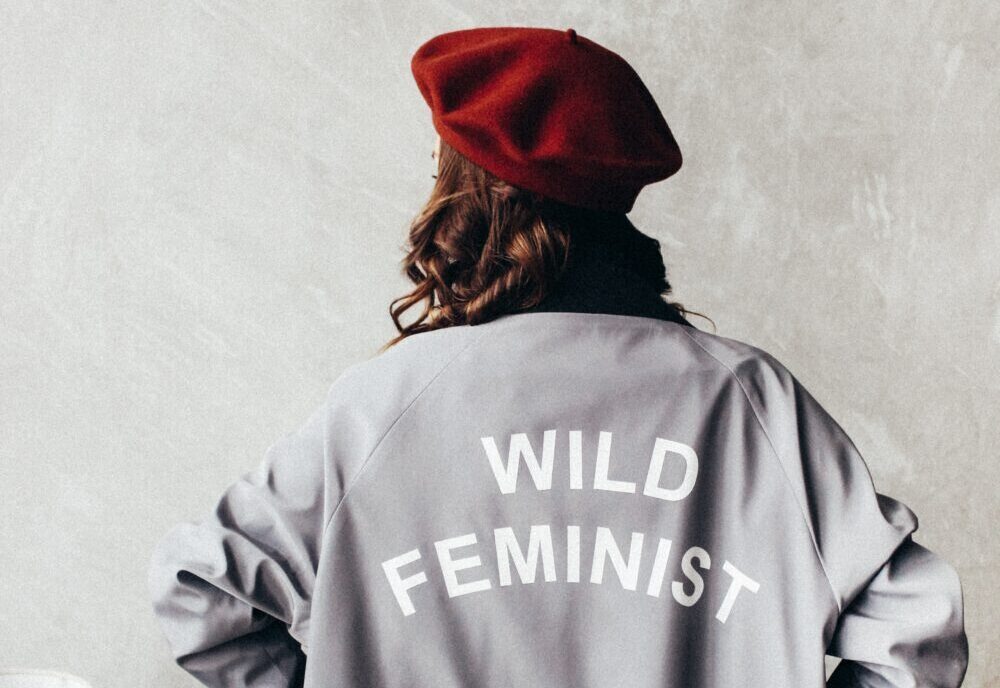No matter where my friends and I started shopping, middle school retail therapy always ended the same way — at the mall, in a clothing store, competing to see who could find the most ridiculous graphic tee. With a Spongebob shirt in one hand and an “I vote pizza” hoodie slung over a shoulder, I was sifting through the racks when I spotted a top with chunky lettering: “Smash the Patriarchy.” Then another — “Wild feminist” — and a third — “Empowered women empower women.”
Unlike the silly tees that we’d been searching for, these shirts were ones that we’d actually buy. It probably had something to do with how they weren’t just shirts to us but polyester proof that we were gutsy enough to wear our hearts (literally) on our sleeves — and, in the spirit of “free the nipple” and “#CropTopDay,” broadcast our very fashionable politics out to the world. Or maybe it was the star-studded lineup that made it cool: Emma Watson sported a “Girls Just Wanna Have Fundamental Human Rights” jacket on Instagram, Bella Hadid strutted down the runway with “The Future is Female” on her chest, and we wanted to be just like them. Whatever it was, empowerment or trendiness, we swiped our cards and walked out of the store feeling like feminists with a capital F. With a chic “GRL PWR” crewneck, we were taking a stand — and dressing the part.
At least, that’s how it’s sold. Because tangled up in the shopping tags and glossy receipts was the real, unmarketable truth: Most feminist shirts are made in a way that’s entirely at odds with what the movement stands for.
And it’s a truth that’s slowly coming out in the wash. In 2020, the fashion titan Boohoo, which owns brands like Pretty Little Thing, MissPap, and Nasty Gal, was investigated for paying workers as little as $4.40 an hour — less than half of the national living wage in Britain. (Nevermind that Nasty Gal was founded by the original “#girlboss” Sophia Amoruso, who wrote a bestselling memoir of the same name pitched to publishers as scripture for women “seeking ownership of their careers and futures.”) And Forever 21, which launches collections to celebrate International Women’s Day nearly every year, was exposed for using factories that grossly underpaid its workers by a margin of $1.1 million in lost wages. It isn’t just one chain or one line, Sam Maher of workers’ rights campaign Labour Behind the Label explained to The Guardian. “It’s an entire system of exploitation.”
But this tragic system is also a very profitable one. For every candy brand that cashes in during Halloween and florist who makes most of their sales on Valentine’s Day, there’s a company that capitalizes off of Women’s History Month and the trillion dollars of female purchasing power. It’s gotten to a point where terms like “femvertising” and “woke-washing” have been added to the corporate dictionary to describe businesses that invest in women as a cheap advertising gimmick, just to make a quick buck. There are Women’s March activists who sell and shop for merch manufactured by Gildan, a company with a long history of sweatshop abuses. There’s a founder and CEO of a huge feminist brand who is an admitted sexual abuser.
Consumers, too, don’t have a free pass from the outward grandstanding. Like my middle school friends and I, some buy into this twisted progressive branding either to make a publicly feminist statement or to jump onto the feminist fashion bandwagon (or both, or neither). And when we buy into it, we also buy into the wave of feminism that places optics above all else. “Were you even at the rally if you didn’t post in a pink shirt? Do you even support reproductive rights if you don’t have a hoodie with a uterus on it?”
What we need to understand is this: What you wear as a consumer, and what you sell as a company, doesn’t make you more or less of a feminist. Not when 85% of garment workers are women. Not when 2% of garment workers earn a living wage. Not when every study, report, article, testimony, and investigation that documents the nauseating abuse garment workers face behind the sewing machine all thread the same message: There are more ways, and better ways, to be a feminist than to wear a shirt that says you are one.
Who are we “empow-her”-ing when we buy a feminist shirt? And how can the future be female when the women making these shirts can’t even afford to buy them? To retailers, who will slap on money-making slogans without a second thought about what they represent, it’s enough to look like a feminist. It’s up to us to actually be one.
Associate Culture Editor




